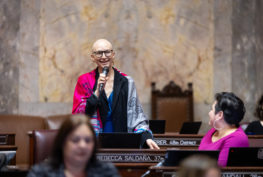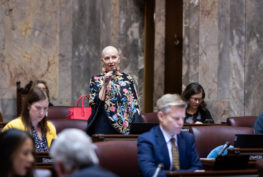OLYMPIA – A bill creating additional pathways for trainees to become licensed electricians was signed into law by Gov. Jay Inslee Friday.
SB 5320, sponsored by Sen. Rebecca Saldaña (D-Seattle), expands the pathways for more people to reach the eligibility threshold for taking the licensing exam for the 01 electrical license. It allows a person issued an electrical training certificate to work without registering in an apprenticeship if the trainee has 3,000 hours of experience working in the electrical construction trade or completed a two-year training school program in the electrical construction trade. The Washington State Department of Labor & Industries (L&I) must also permit these trainees to qualify for the journey-level electrical examination if the applicant demonstrates 8,000 hours of experience in the electrical construction trade, 4,000 of which must be new industrial or commercial electrical installations.
The bill recognizes out-of-state journey-level electrician certificates for those licensed in a state that requires at least 8,000 hours of supervised experience in the electrical construction trade and who complete 16,000 hours of work in another state, provided in both cases 4,000 of their hours are in industrial or commercial electrical installations.
It also makes applicants eligible to take the exam for the journey-level certificate of competency if they have 8,000 hours of experience in the electrical construction trade installing and maintaining electrical wiring and equipment while serving in a construction battalion in the armed forces.
“The bill is a major step forward for the electrical construction trade in Washington,” Saldaña said. “We are expanding opportunities for people while protecting the higher standards we’ve established for journey-level electricians. We can have a robust workforce and ensure all electrical construction work is performed safely.”
This legislation supports Washington state’s bold efforts to move away from greenhouse gases and toward electrification by building a workforce that helps us better meet modern demands.
The new law takes effect on July 1, 2023.




